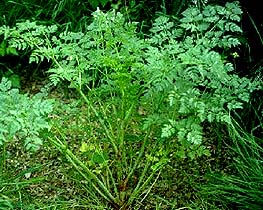Hemlock
Hemlock is an annual or biennial weed widespread in Europe. It has an unpleasant smell, a hollow stem with red spots and small white blossoms. All parts of the plant are very poisonous, which is due to the alkaloid coniin.
The symptoms were familiar to ancient Greeks and Romans, and the plant usually had to play the part of an executioner. | The lethal dose for a human being is 0.15 g. It causes nausea and vomiting, movement- and speech retardation; the pupils dilate, which is followed by characteristic rising paralysis of the limbs and eventually paralysis of the thoracic muscles, leading to death. |
It is most famous for being the cause of the death of a great philosopher, Socrates, who was accused of atheism. His prominent disciple Plato described his death as a calm and yet, an anxious one, âhis legs became colder and colder, he lay upon the garden-seat and kept talking to the people around. He kept his thoughts and mind clear till the very end.â This tragedy happened ca 399 BC.
In the past, hemlock was used as a painkiller in folk medicine. There is no data as to its application in modern medicine.
Similar poisonous effects have two other plants from the same group, often mistaken for hemlockâthe water hemlock (Cicuta maculata) and the western water hemlock (Cicuta douglasii). Their toxicity is aimed mainly at the central nervous system and is due to alkaloids such as cicutoxin and cicunol.

